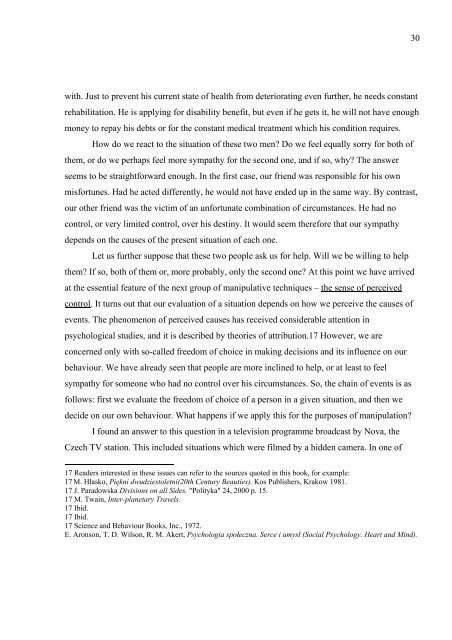PSYCHOMANIPULATION - Tomasz Witkowski
PSYCHOMANIPULATION - Tomasz Witkowski
PSYCHOMANIPULATION - Tomasz Witkowski
Create successful ePaper yourself
Turn your PDF publications into a flip-book with our unique Google optimized e-Paper software.
with. Just to prevent his current state of health from deteriorating even further, he needs constant<br />
rehabilitation. He is applying for disability benefit, but even if he gets it, he will not have enough<br />
money to repay his debts or for the constant medical treatment which his condition requires.<br />
How do we react to the situation of these two men? Do we feel equally sorry for both of<br />
them, or do we perhaps feel more sympathy for the second one, and if so, why? The answer<br />
seems to be straightforward enough. In the first case, our friend was responsible for his own<br />
misfortunes. Had he acted differently, he would not have ended up in the same way. By contrast,<br />
our other friend was the victim of an unfortunate combination of circumstances. He had no<br />
control, or very limited control, over his destiny. It would seem therefore that our sympathy<br />
depends on the causes of the present situation of each one.<br />
Let us further suppose that these two people ask us for help. Will we be willing to help<br />
them? If so, both of them or, more probably, only the second one? At this point we have arrived<br />
at the essential feature of the next group of manipulative techniques – the sense of perceived<br />
control. It turns out that our evaluation of a situation depends on how we perceive the causes of<br />
events. The phenomenon of perceived causes has received considerable attention in<br />
psychological studies, and it is described by theories of attribution.17 However, we are<br />
concerned only with so-called freedom of choice in making decisions and its influence on our<br />
behaviour. We have already seen that people are more inclined to help, or at least to feel<br />
sympathy for someone who had no control over his circumstances. So, the chain of events is as<br />
follows: first we evaluate the freedom of choice of a person in a given situation, and then we<br />
decide on our own behaviour. What happens if we apply this for the purposes of manipulation?<br />
I found an answer to this question in a television programme broadcast by Nova, the<br />
Czech TV station. This included situations which were filmed by a hidden camera. In one of<br />
17 Readers interested in these issues can refer to the sources quoted in this book, for example:<br />
17 M. Hłasko, Piękni dwudziestoletni(20th Century Beauties). Kos Publishers, Krakow 1981.<br />
17 J. Paradowska Divisions on all Sides. "Polityka" 24, 2000 p. 15.<br />
17 M. Twain, Inter-planetary Travels.<br />
17 Ibid.<br />
17 Ibid.<br />
17 Science and Behaviour Books, Inc., 1972.<br />
E. Aronson, T. D. Wilson, R. M. Akert, Psychologia społeczna. Serce i umysł (Social Psychology. Heart and Mind).<br />
30


